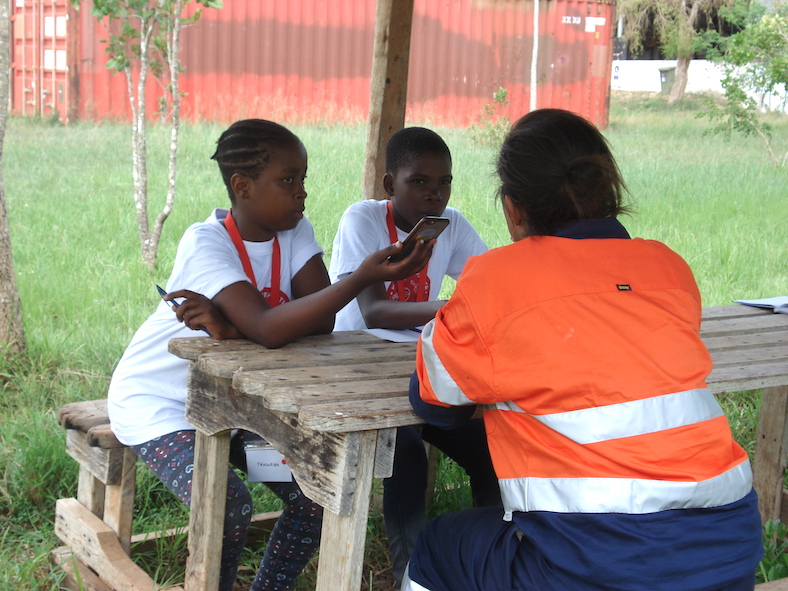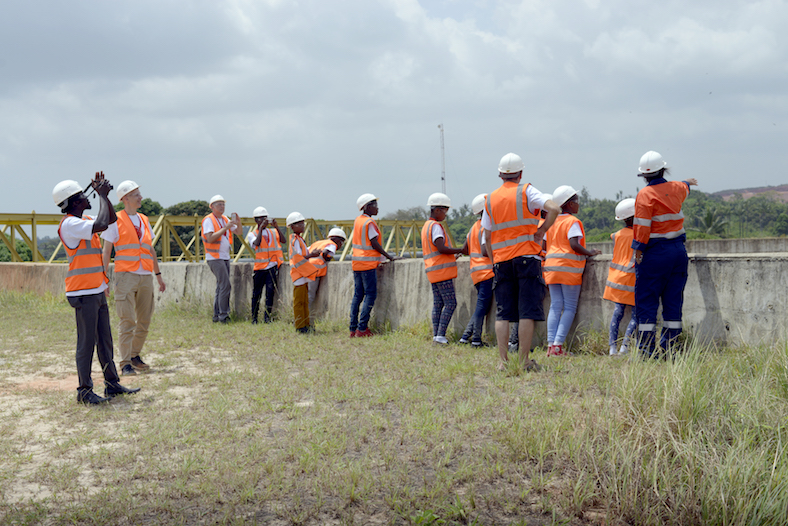We Have to Rehabilitate, We Have to Restore
Why do you think it is important to people to conserve the environment?
Where else are we going to live? We only have one earth. If we don’t look after our home, where are we supposed to go?
How do you make good use of your waste products?
As a mineral sands operations, most of our waste product actually comes from the sands. With the sands that we don’t use we create these tailings storage facility which is here on site. It’s a big wall and inside we put our other waste products – if it’s that you want to call them – that are called slimes, which are the clay and the water and other minerals that we don’t need in our mining.
What do you do to conserve the land after mining?
At Base Titanium, we have an environment department that works alongside the mining department. After operations, we have to rehabilitate and we have to restore, so we have to put back the land if not as we found it then better than we found it. So what we do is a rehabilitation process on the areas that already have been mined. Once the miners have finished mining and moved to the next block, the environment team comes up. They’ve saved up top soil from the very beginning. With sand being our main waste product we put a layer in top of that called mulch, and then we put the top soil. Then we plant grass, and then we plant indigenous plants and trees.

When you are planting trees, do you make seedbeds or do you buy seedlings from farmers outside?
I’m not 100% sure of how we plant but I do know that we buy our seedlings from the community groups around us. We have important knowledge for them about indigenous trees, and they give knowledge to us, too, and with that we are able to tell them which seedling they should be getting. We buy it from them so they have an income.
What type of trees do you plant?
We plant indigenous trees, so they are trees that should be here. We don’t have any exotic trees which means that they come from somewhere else and are transplanted.

After planting the trees, who do they belong to?
They belong to the communities around us. Base Titanium doesn’t own the land we are mining on. We lease it, which means, we are borrowing it. We then have to give it back to the government. So, the trees we plant belong to the people of Kenya.
Pumpkins and watermelons are good in conserving the soil, do you also plant them?
I can’t say absolutely sure that we plant pumpkins and watermelons. I know that it is indigenous trees. I can find out and get back to you.
What is your source of water?
We have various sources of water. We have boreholes, we have a dam, and we have a recycling initiative. Whatever water we use in the mining we try as hard as we can to bring back into use again so that it doesn’t go to waste. Because water is very precious.

How far does your water come from?
For example with the dam, it will come from a seasonal river which is the Mukurumudzi. We have boreholes and use water found on our mine site rather than from other areas.
Do your waste products have any effect on the environment?
I would say yes, they do, because they have an effect on the shape of the land. But it’s not an ill effect, it’s not damaging the environment. It’s just shifting the shape of what was here before.
How far should the villages be from the mining factory?
The special mining lease is a document that is drawn up between Base Titanium and the government. The distance away from where you mine is decided between them. The villages here that used to be are not on the mine site. But once you get to the edge of our boundary, there are villages. They are very very close, it’s just that they are not on the mine site.
Why is it important to be in full gear before working?
We are a working mine and accidents can happen. You need to be in full gear especially if you are working in the plant or on site to make sure that you are fully protected from your head to your toes. You have to wear a helmet, you all have to wear goggles because there’s lot of dust flying around, and if you are in the plant something could spark off and hurt your eyes. Our long sleeve shirts and our reflective vests protect our arms and make sure that you can be seen and our trousers protect our legs. We then have safety boots, and if you’re working inside a plant, you also have things to plug inside your ears to shut out the noise. And those who are working in maintenance and with equipment that’s heavy also wear gloves to make sure that their hands are protected.
We were told to come with long trousers and socks, why is that?
We have to take in consideration the safety of all our visitors as well as ours. We are going to be outside, so you need to make sure that your legs are covered, and have closed shoes so you don’t stub your toe and hurt yourself. If you weren’t able to bring closed toe shoes, we have safety boots to a certain size. But it’s really important for anyone that is slightly younger, below the age of fifteen, to have their own shoes.

Have you ever experienced soil erosion or landslides?
In the short time that I worked at Base Titanium, no, we haven’t experienced a landslide or soil erosion.
Do you have challenges conserving the environment?
Yes, I think, everyone has challenges. You could have a planting season where you put plants down and then they get washed away. We have a nursery where they test to see if all the techniques are working for the conservation and rehabilitation and restoration. So you have to try it, tweak it a little bit and watch if it works for what you were trying to do.
Thank you very much for the interview.
You are welcome.


